- Home
- Margaret Pemberton
Yorkshire Rose
Yorkshire Rose Read online
Bello:
hidden talent rediscovered
Bello is a digital only imprint of Pan Macmillan, established to breathe life into previously published classic books.
At Bello we believe in the timeless power of the imagination, of good story, narrative and entertainment and we want to use digital technology to ensure that many more readers can enjoy these books into the future.
We publish in ebook and Print on Demand formats to bring these wonderful books to new audiences.
About Bello:
www.panmacmillan.com/bello
Sign up to our newsletter to hear about new releases events and competitions:
www.panmacmillan.com/bellonews
Contents
Margaret Pemberton
Dedication
Chapter One
Chapter Two
Chapter Three
Chapter Four
Chapter Five
Chapter Six
Chapter Seven
Chapter Eight
Chapter Nine
Chapter Ten
Chapter Eleven
Chapter Twelve
Chapter Thirteen
Chapter Fourteen
Chapter Fifteen
Chapter Sixteen
Margaret Pemberton
Yorkshire Rose
Margaret Pemberton
Margaret Pemberton is the bestselling author of over thirty novels in many different genres, some of which are contemporary in setting and some historical.
She has served as Chairman of the Romantic Novelists’ Association and has three times served as a committee member of the Crime Writers’Association. Born in Bradford, she is married to a Londoner, has five children and two dogs and lives in Whitstable, Kent. Apart from writing, her passions are tango, travel, English history and the English countryside.
Dedication
For my sister Janet – a Yorkshire girl.
Chapter One
“Look at that, Rose!” Laurence Sugden said with Yorkshire pride, one arm around his daughter’s slender shoulders, the other making a great sweeping gesture from the far right of the view in front of them, to the far left. “From up here you can see nearly the whole of Bradford. There’s Lister’s Mill.” He pointed to the smoking, awesomely high mill chimney dominating a sea of smaller chimneys. “It’s the highest mill chimney in the country and the top is so broad they say a man could drive a horse and cart around it!”
Rose giggled. She was twelve years old and for as long as she could remember her father had been telling her the story of the horse and cart.
“The man would have to get the horse and cart up there first,” she said, as she always said.
It was the 5th of May, 1908, and they were standing on Odsal Top on the far side of the city. It was the first time she had ever seen Lister’s Mill, which was the nearest of the city’s score of mills to her terraced home, from such a distance.
“And there’s Drummond’s Mill chimney,” her father continued, “and Black Dyke Mills chimney, and Whiteheads. And there’s the Cathedral, lying in the very bottom of the bowl.”
Laughter bubbled up in Rose’s throat. Her father sometimes had a very funny way of describing things, but he was right about the bowl. All the hills around Bradford, with the moors stretching out beyond them, cupped the city in what looked, from this distance, to be a giant, smoke-hazed bowl.
“And there’s Lutterworth’s,” her father said, his hand tightening slightly on her shoulder.
Rose covered his hand with hers. Her father was Head Tapestry Designer at Lutterworth’s. It was a position he was rightly proud of. Tapestry designers weren’t common-or-garden mill workers, like weavers or spinners. A man had to have artistic talent to be a tapestry designer. And to be Head Tapestry Designer at a mill as big as Lutterworth’s, he had to have a lot of artistic talent.
The bulky Kodak camera that hung from his shoulder, and that was the reason for their excursion to a part of the city’s outskirts Rose had never visited before, slipped forward slightly and he heaved it back, saying, “Have you ever seen such a grand sight, Rose? All those chimneys belching smoke, all that power and energy? Bradford may be a mucky city, but it’s also a mighty city. Can you see how individual many of the chimneys are? Lister’s chimney is square with decorative fluting on all four sides and the upper third is pedimented and decorated with dummy window-arches, just like an Italian bell-tower.”
Laughter fizzed again in Rose’s throat. It was typical of her father that he would see the beauty in the might and power of Bradford’s mills, where another man would have seen only the grime. She, too, was fascinated by the sheer size and majesty of some of the city’s mills. Lister’s, of course. And, out of loyalty to her father, Lutterworth’s. But most of all to a mill her father hadn’t mentioned by name. A mill he never mentioned by name.
Rimmington’s.
It lay very close to Lister’s, its chimney looking small in comparison. It wasn’t small, though. Built in 1865, it was two hundred feet high. She knew the exact height, because ever since she had been a small girl she had gone out of her way to find out everything she could about Rimmington’s. Rimmington’s wasn’t just any mill. Rimmington’s was owned by Caleb Rimmington and that made Rimmington’s very special indeed to Rose, for though she had never met him, Caleb Rimmington was her grandfather.
“I think we can be on our way home now, little love,” her father said, removing his arm from her shoulder and picking up his collapsible tripod. “I’ve got some fine pictures of the city. They may even find their way into the Yorkshire Observer.”
Rose hoped so. She knew how much such photographic successes meant to him. Her father regarded photography as an art, taking as much pride in the pictures he took as he did in the paintings he occasionally sold.
As they began to walk away from their magnificent viewpoint and towards the distant tram terminus she said, her thoughts still on Rimmington’s, “If Grandfather Rimmington hadn’t fallen out with Mother, when you and Mother married, would you have been Head Tapestry Designer at Rimmington’s, not Lutterworth’s?”
Laurence Sugden’s handsome face, as classically sculpted as a Greek statue’s, tightened. “Now as to that, Rose lass, who’s to say?” he said, keeping his voice light and indifferent as he always did whenever he was obliged to make any comment concerning either Caleb Rimmington or his mill.
Rose knew that he didn’t want her to pursue the subject, but if she didn’t, how would she ever know things?
“Do you think Grandfather Rimmington is ever curious about us?” she asked, as the houses that marked the tram terminus came into view. “Do you think he ever wishes he hadn’t fallen out with Mother when you and Mother married?”
Laurence sighed. He could understand Rose’s mystification as to why her grandfather never made any contact with her, or with Noel and Nina, but how could he possibly explain it? He could hardly say that her grandfather was a pig-headed autocrat who, having once taken the attitude that his daughter had demeaned both him and herself by marrying one of his employees when he had had a much finer marriage marked out for her, would never change his mind about cutting her out of his life, not even if he lived to be a hundred.
“It’s impossible to tell what other people think, Rose, or why they often do things which seem totally inexplicable.”
He looked down into her troubled eyes and his heart contracted. He had three dearly-loved children but this child, his youngest child, was the child of his heart. Unlike her elder sister Nina who, at fourteen, was already showing signs of becoming a head-turning beauty, Rose hadn’t inherited his classical features. Her flaming red Rimmington hair had far too much ginger in it to be described as titian, her toffee-brown ey
es were a little too large, her freckled nose a little too short, her generous shaped mouth far too wide. And from the first moment she had been placed in his arms, her unfocusing, Pekingese eyes meeting his, his heart had gone out to her in complete and utter love.
In the intervening years he had often wondered if the special feelings she had aroused in him had been occasioned by the knowledge that, without the armour of beauty, she would perhaps be vulnerable in a way her more favoured brother and sister never would be.
Despite his unhappiness at the subject under discussion, an amused smile touched the corners of his mouth. If, when she had been new-born, he had been thinking along those lines, then he couldn’t have been more wrong. Rose’s merry little personality was far from being that of an introverted plain Jane. She was totally unselfconscious and exuberantly outgoing, completely unenvious of the compliments her elder sister’s delicately oval face, double-lashed sea-green eyes and gold-red hair, so ceaselessly garnered.
His smile deepened. Rose possessed a quality far rarer than physical beauty. Like her mother, she possessed an infinite capacity for happiness and for making others happy, which was why, seeing her usually radiant eyes so troubled, his heart felt as if it were being painfully squeezed within his chest.
His fingers tightened around the strap of his camera case. Damn his father-in-law! His money and his mill meant nothing to Lizzie, but his affection did. And so, it seemed, it did to at least one of her daughters.
“Your Grandfather Rimmington strongly disapproved of your mother’s wish to marry me,” he said at last, judging that she was now old enough to be told the truth of the matter.
“Because you were poor?”
He flicked a circling bee out of the way. “Being poor is a relative thing, Rose. In your Grandfather Rimmington’s eyes I undoubtedly was poor, but compared to lots and lots of other young men I was wealthy. I lived in a house that had an outdoor privy to itself. I never went barefoot. And I won a scholarship to Grammar School. No one who’s ever received a good education can ever consider themselves to be poor.”
Rose digested this information in silence for a minute or two. She’d always known how much her father valued education and she’d always tried hard to make him proud of her where schoolwork was concerned. Not that she wanted to be a blue-stocking. She wanted to be a tapestry designer, like him. She was going to be a tapestry designer.
“If Grandfather Rimmington didn’t want Mother to marry you,” she said, making the most of her father’s sudden willingness to talk about a subject that had previously always been strongly discouraged, “who did he want her to marry?”
Laurence’s jaw tightened. The conversation was getting into deep waters, but now that it had been embarked upon there was nothing for it but to see it through to the end.
“Someone who could consolidate his social position,” he said, striving not to let his bitter feelings towards his wife’s father show in his voice. “Your great-grandfather Rimmington was a self-made man, Rose, and your grandfather wanted a son-in-law with a title, even if the title was only that of a Sir Somebody-or-other.”
Rose wrinkled her nose, unable to imagine her mother married to anyone else but her father. “So that Mother would be a lady?” she asked, wondering just what a social position was, and if it was as uncomfortable as it sounded.
They were nearly at the tram terminus now and though there was a tram waiting to make the return journey down into the city centre, her father didn’t increase speed so that they could catch it. Instead he stopped walking and looked down at her gravely.
“Never be fooled into thinking that a title can turn anyone into a gentleman or a lady,” he said, with a note in his voice that Rose knew meant he was being very, very serious, “because they don’t. It takes far more than that, little love. It takes good manners and compassion and a love for everything that is beautiful and good. Your mother never had need of marrying a baronet in order to be a lady. She simply is a lady. And she would be a lady even if she’d been born in the poorest of Lister’s or Lutterworth’s mill cottages.”
Rose nodded. That her mother was a lady she understood very well. Everyone said so. Johnny, the milkman. Mr Jabez, who delivered their coal. Mr Todd, the headmaster of Toller Lane Junior School, who lived next door to them. Mrs Mellor, who lived next door on the other side of them and who rarely had a good word to say about anyone.
As, hand in hand, they resumed their walk towards the tram terminus, she said musingly, “And do you think that Mother’s brother’s children know that Mother is a lady?”
It was a tortuous way of referring to her uncle and of bringing her cousins into the conversation but, as she had never met either her uncle or her cousins, she didn’t know how else to do so.
“Your cousins?” Her father stared down at her bewilderedly. “Well of course they know that Mother is a lady! She’s their aunt and the only other family they have, apart from you and Nina and Noel. Grandfather Rimmington’s refusal to allow any contact between Walter and your mother, or between Walter’s children and you and Nina and Noel, doesn’t alter that one jot.” His bewilderment gave way to bemusement. “You really do ask the most peculiar questions sometimes, little love. You’ll be asking me next how to spell Constantinople.”
Despite the weight of her thoughts, she grinned. Constantinople was the name of a pen and paper word game they often played and she’d been able to spell it ever since she’d been three years old.
There was no one else at the tram terminus and the tram that had been waiting there had left for its steeply downhill journey several minutes ago.
As they seated themselves companiably inside the welcome shade of the tram shelter she again referred to her cousins. “Have you met them?” she asked curiously. “Do they know all about us? Do they know our names?”
Laurence smoothed his neatly clipped moustache with his thumb and forefinger. It was only to be expected that Rose was curious about her cousins. Nina certainly was, though it was the difference in their lifestyles that most aroused Nina’s curiosity. “Is their house very, very big? Do they have maids? Does cousin Lottie go to school or does she have a governess?”
Knowing that Rose’s questions would be far different and realizing that the subject was one she was going to pursue at least until the next tram arrived, he said patiently, “I haven’t seen them for a long, long time, little love.” Not since the day of your grandmother’s funeral, he could have added, but didn’t. “And I’m sure they know your names. Just as you know theirs.”
Rose retrieved a Glacier Mint from the pocket of her blue and white gingham dress, removed some fluff that had accumulated on it and popped it into her mouth. “And who is the eldest, William or Harry?” she asked, deeply interested.
Laurence set his cumbersome camera case and tripod down on the floor between his feet. Giving her information about her Rimmington cousins was less traumatic than talking about her grandfather.
“William is the eldest,” he said, taking a pipe out of one of his jacket pockets and searching in the other for his tin of tobacco. “He must be seventeen by now. Harry is a year younger. He was born the same year as Noel. And Lottie is just a little bit younger than Nina and a little bit older than you.”
“Then she must be thirteen,” Rose said, wondering if Lottie had the Rimmington red hair and, if she did, if it was a gingery marmalade colour, like her own, or a sizzling titian, like Nina’s.
“Do William and Harry paint and play music, like Noel?” she asked, wishing she could meet them, wishing they lived as a proper family, spending Christmas and birthdays together and going for picnics together on Shipley Glen and Baildon Moor.
Laurence tamped tobacco into the bowl of his pipe. “The Rimmingtons aren’t artistic,” he said wryly. “The artistic talent you and Noel have inherited comes from the Sugden side of the family. The Rimmingtons are all physical action. One of your great-uncles died fighting the Zulus. Another emigrated to the wilds of Canada and becam
e a fur trapper.”
“And Grandfather became a wool baron?”
There was pride in her query and Laurence frowned slightly. “That’s how he likes to think of himself, yes,” he said, lighting his pipe, not wanting her to admire in any way the ruthless autocrat who had come damn near to ruining all their lives.
A tram trundled into view and they rose to their feet. “I’m going to visit my Grandfather Rimmington when I’m older,” Rose said with fierce determination. “Whether he wants to meet me or not, I’m going to meet him!”
Laurence clamped his teeth hard on his pipe stem. If this was the result of speaking frankly to her then the next time she asked for information about the Rimmington side of her family, he would exercise more caution. The very thought of her, or Nina and Noel, turning up on the doorstep of Caleb Rimmington’s ostentatious mansion made the hair on the back of his neck stand on end. He and Lizzie had suffered enough explosive confrontations with her father to last them a lifetime and they most certainly didn’t want any more.
“I don’t think that would be a very good idea, little love,” he said as they stepped inside the tram. “In fact, I think it might be a very, very bad idea.”
“Did Pa say why it would be a bad idea?” Noel asked, frowning in concentration as he applied glue to a difficult join on the model monoplane he was making.
It was after tea and they were in the parlour. Unlike every other parlour they had ever been in, it wasn’t a stuffy, uncomfortable room used only for when company called. Whenever it was even the slightest bit chilly a coal fire glowed in the black-leaded grate. Books vied for space with precious knick-knacks behind the glass-fronted doors of a walnut display cabinet. Against one wall was an upright Broadwood piano, its top crammed with silver-framed photographs. In the wide window-bay there was a mahogany table covered with a floor-length rust-coloured plush cloth, fringed at the hem. It was at this table that Noel was now working, intricate pieces of chamfered balsa-wood laying in neat piles on the sheet of newspaper that was protecting the plush from drips of glue.

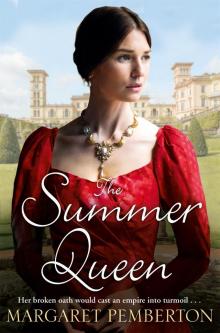 The Summer Queen
The Summer Queen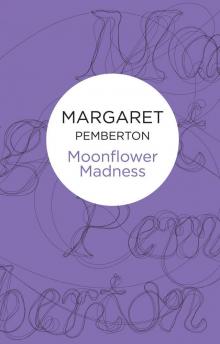 Moonflower Madness
Moonflower Madness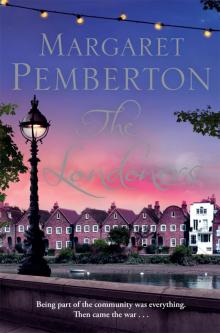 The Londoners
The Londoners The Flower Garden
The Flower Garden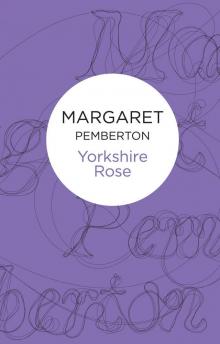 Yorkshire Rose
Yorkshire Rose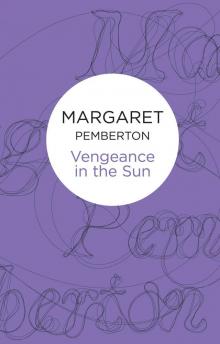 Vengeance in the Sun
Vengeance in the Sun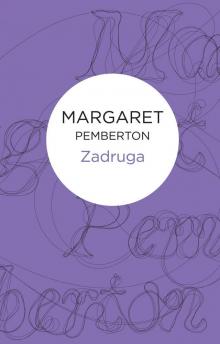 Zadruga
Zadruga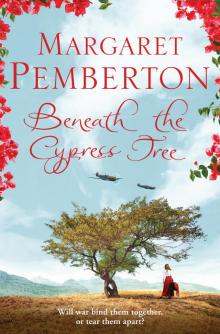 Beneath the Cypress Tree
Beneath the Cypress Tree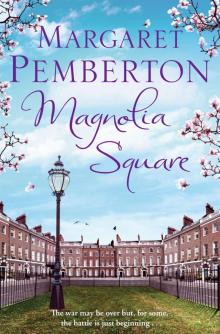 Magnolia Square
Magnolia Square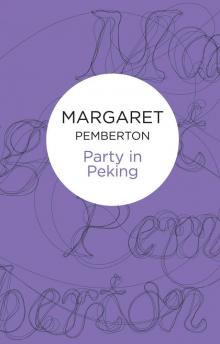 Party in Peking
Party in Peking Lion of Languedoc
Lion of Languedoc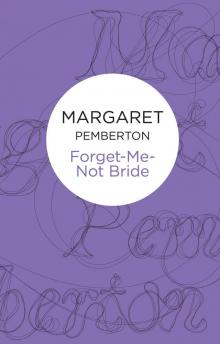 Forget-Me-Not Bride
Forget-Me-Not Bride The Guilty Secret
The Guilty Secret Rendezvous With Danger
Rendezvous With Danger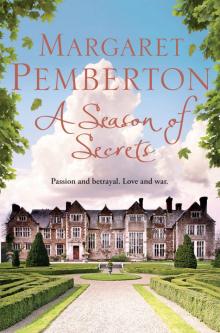 A Season of Secrets
A Season of Secrets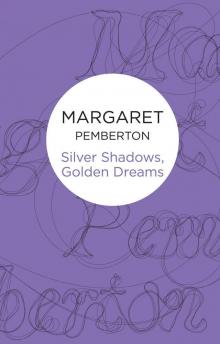 Silver Shadows, Golden Dreams
Silver Shadows, Golden Dreams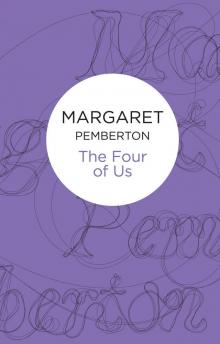 The Four of Us
The Four of Us Devil's Palace
Devil's Palace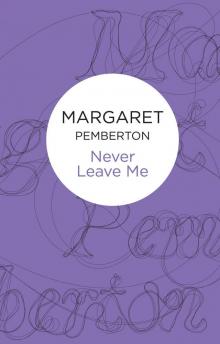 Never Leave Me
Never Leave Me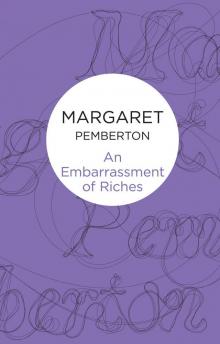 An Embarrassment of Riches
An Embarrassment of Riches African Enchantment
African Enchantment White Christmas in Saigon
White Christmas in Saigon Coronation Summer
Coronation Summer A Multitude of Sins
A Multitude of Sins Tapestry of Fear
Tapestry of Fear A Many-Splendoured Thing
A Many-Splendoured Thing